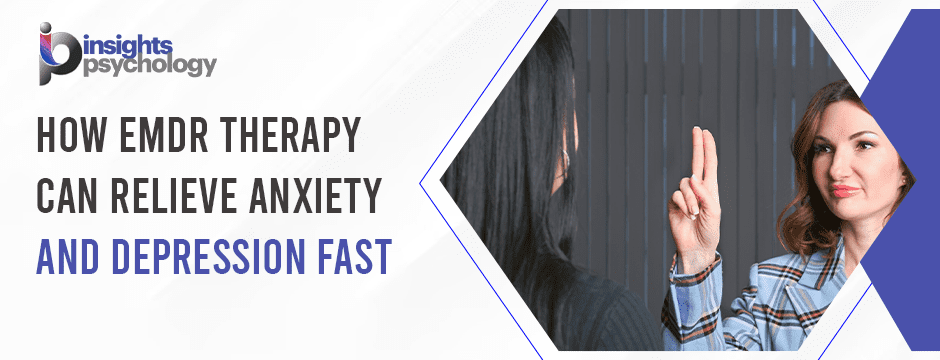If you’ve ever found yourself caught in an emotional loop of worry, fear, and sadness—paralyzed by anxiety or overwhelmed by depression—you’re not alone. Millions of people silently battle these mental health challenges every day, often feeling like nothing will work. But what if relief was closer than you think? What if one therapy could help rewire your brain, ease your emotional burden, and bring you fast, lasting relief?
At Insights Psychology, we’ve seen lives transformed through a revolutionary approach known as EMDR Therapy (Eye Movement Desensitization and Reprocessing). While EMDR was originally developed for trauma, recent breakthroughs have shown it’s equally powerful in relieving anxiety and depression—often faster than traditional talk therapy.
Let’s dive into why EMDR could be the game-changing solution you’ve been searching for.
What is EMDR Therapy and How Does It Work?
EMDR might sound complex, but the core idea is beautifully simple. It’s a structured therapy that helps you process and release emotionally charged memories that are stuck in your brain.
Here’s how it works:
- You recall a distressing memory (don’t worry—you’re in control the whole time).
- Your therapist guides you through bilateral stimulation (typically eye movements, tapping, or sounds).
- This helps your brain reprocess the memory, shifting it from a reactive, emotional experience to a more neutral one.
The result? The intensity of the emotions tied to that memory fades. You feel lighter, more grounded, and your reactions to similar situations begin to change—naturally.
The Neuroscience Behind It
EMDR leverages your brain’s innate healing mechanisms. When traumatic or highly emotional events occur, they sometimes get “frozen” in your nervous system. EMDR essentially unlocks these mental blockages, allowing your brain to finally process the emotions, beliefs, and sensations that have kept you stuck.
This is especially critical for people with anxiety and depression, where unprocessed emotional stress and negative self-beliefs are often at the root of their suffering.
Why EMDR is a Fast and Effective Solution for Anxiety and Depression
Many therapies offer insight. EMDR offers resolution—and often in far fewer sessions than traditional cognitive behavioral therapy (CBT) or medication alone.
Here’s why EMDR works so quickly:
- It Targets the Root, Not Just the Symptoms
Anxiety and depression aren’t just about what’s happening now—they often stem from past emotional wounds. EMDR goes directly to these deeper causes, eliminating the need for years of surface-level talk therapy. - Your Brain Does the Work
EMDR doesn’t involve advice-giving or interpretation. Instead, it activates your brain’s natural ability to heal, just like it heals a cut or broken bone. That’s why it feels organic and fast-acting. - It Bypasses Overthinking
If you’ve ever felt like you “think too much,” EMDR might be for you. It taps into the emotional processing part of the brain, which is often more effective than logical reasoning when it comes to emotional distress. - Immediate Shifts Are Common
Many clients report feeling dramatically better even after one or two sessions, especially when treating recent or acute anxiety triggers.
Is EMDR Therapy Right for You?
You might be wondering: “Is EMDR really for me?”
The short answer: If you’re struggling with anxiety or depression—especially if it feels tied to past experiences—the answer is likely yes.
Here’s who EMDR can help most:
- Adults with generalized anxiety, social anxiety, or panic attacks
- People living with depression that feels stuck or unresponsive to meds
- Those with negative self-beliefs or inner critical voices
- Clients who’ve experienced emotional abuse, loss, or childhood trauma
- High-achievers with stress-related burnout
Even if your experience doesn’t fit into a diagnostic box, EMDR may still bring immense relief—because it works at a deep emotional level, regardless of diagnosis.
Why Choose Insights Psychology for EMDR?
At Insights Psychology, we don’t believe in one-size-fits-all mental health care. Here’s what sets us apart:
- Certified EMDR Specialists
Our team includes trauma-informed clinicians certified in EMDR therapy. You’ll be working with professionals who understand the intricacies of emotional healing.
- Comfort-Focused Environment
Therapy isn’t just about techniques—it’s also about feeling safe and supported. Our warm, welcoming setting helps you feel at ease from your very first session.
- Whole-Person Approach
We combine EMDR with other evidence-based therapies (like CBT and mindfulness) for a fully personalized plan—because you’re more than a diagnosis.
- Fast Results, Long-Term Change
Our EMDR clients often see results in 6–12 sessions. But more importantly, these aren’t just quick fixes—they’re sustainable transformations.
What to Expect in Your First EMDR Session
If you’re new to therapy, the unknown can be intimidating. Here’s what happens when you walk into Insights Psychology:
We Listen First
You’ll never be rushed or judged. We start with understanding your story, your symptoms, and your goals.
Personalized Plan
If EMDR is right for you, we’ll explain the process clearly and build a plan around your needs and pace.
A New Beginning
Most clients feel a sense of hope after the first session—because they finally feel like they’re moving forward.
Final Thoughts: Your Relief Could Start Today
Anxiety and depression don’t have to define your story. EMDR therapy offers a pathway to clarity, calm, and confidence—and it starts with a single step.
If you’re tired of temporary fixes and ready for real change, EMDR at Insights Psychology could be your breakthrough.
Ready to explore how EMDR can help you feel like yourself again? Contact Insights Psychology today for a free 15-minute consultation with one of our EMDR specialists. Let’s talk about your needs and map out a plan for relief—together.
FAQs: Fast-Acting EMDR Therapy for Anxiety and Depression Relief
1. How quickly can EMDR therapy start relieving anxiety and depression?
Many clients notice improvements within just a few sessions of EMDR therapy near me, often between 3–6 visits. Because this approach targets distressing memories directly, it can lead to faster relief than traditional talk therapy. For those seeking quick changes, EMDR is designed to reprocess negative experiences and ease emotional distress efficiently. While results vary, many individuals begin feeling lighter, calmer, and more in control within weeks of starting treatment.
2. What exactly happens in an EMDR session (especially when targeting anxiety & depression)?
During emdr therapy for rapid anxiety relief, a trained therapist guides you to recall distressing memories while engaging in bilateral stimulation, such as guided eye movements or tapping. This process helps the brain reframe and desensitize the emotional impact of these recollections.. By targeting root causes rather than surface symptoms, EMDR sessions for anxiety and depression aim to deliver significant emotional shifts and lasting relief in a shorter time frame.
3. Is EMDR more effectual than conventional talk remedy for fast relief?
Some clients find emdr for depression remission quickly more effective than talk therapy because it directly addresses the neurological storage of traumatic or distressing memories. While traditional therapy may require months to reduce symptoms, EMDR can often produce changes within a few sessions. Effectiveness depends on the individual, but for those seeking fast, transformative results, EMDR can be a powerful option worth exploring through a qualified mental health provider.
4. Can EMDR be done virtually and still relieve symptoms quickly?
Yes. online emdr therapy fast results anxiety sessions are highly effective when facilitated by a trained professional. The same bilateral stimulation techniques used in person can be adapted for secure video sessions without losing therapeutic impact. Many clients experience the same level of symptom reduction virtually, making online EMDR a convenient choice for busy schedules, travel limitations, or accessing specialized therapists not available locally.
5. Does EMDR work for everyone struggling with anxiety and depression?
Fast-acting emdr techniques for anxiety and depression help many individuals, but results vary based on the person’s history, current symptoms, and treatment goals. Some see rapid progress, while others may require more sessions or a blended approach with other therapies. An initial consultation with an EMDR-trained therapist is the best way to determine whether this evidence-based treatment is the right fit for your mental health needs.
6. Is there solid scientific evidence supporting EMDR for fast relief from anxiety and depression?
Studies show how many sessions for emdr to relieve anxiety depression fast can vary, but many achieve measurable results in fewer sessions than traditional methods. exploration supports EMDR as an substantiation- grounded remedy for trauma, anxiety, and depression. Endorsed by leading mental health organizations, it’s a trusted approach for those who want rapid relief without long-term dependence on talk therapy alone.
You’ve learned how EMDR Therapy works fast; now see how ending perfectionism can keep your progress unstoppable.

